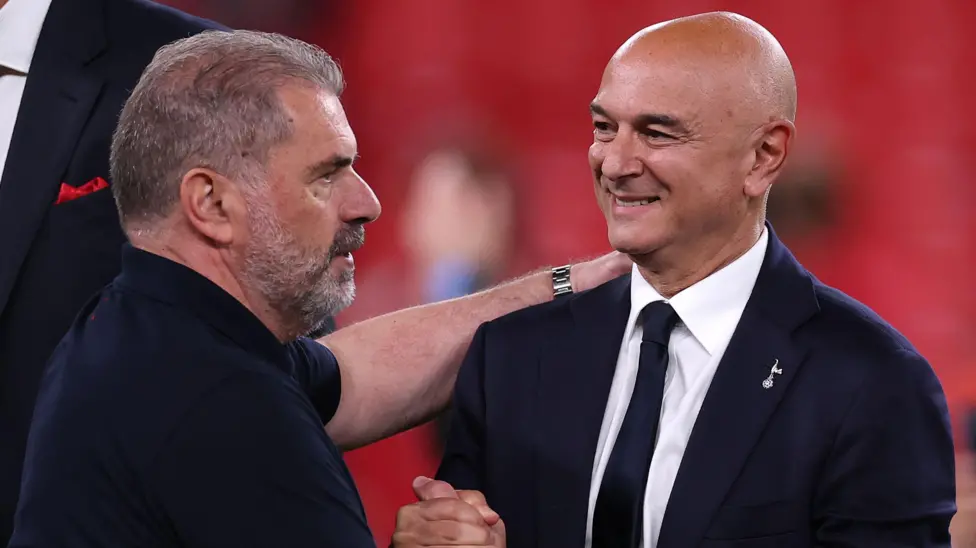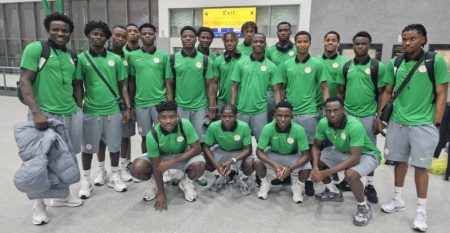Tottenham Hotspur chairman Daniel Levy has opened up about the emotional challenge of parting ways with manager Ange Postecoglou, just weeks after the Australian led the club to a historic Europa League triumph.
Postecoglou was dismissed only 16 days following Spurs’ 1-0 victory over Manchester United in Bilbao, which secured the club’s first major trophy in 17 years. Despite this landmark success, Spurs endured a dismal Premier League campaign, finishing 17th, sparking calls for change. Former Brentford boss Thomas Frank was swiftly appointed as Postecoglou’s successor.
Levy expressed his gratitude for Postecoglou’s contributions during his two-season spell at Tottenham. “I don’t regret appointing Ange, I’m very grateful to him. In his first season, we finished fifth, and in his second, we were over the moon to win a trophy,” Levy told the club’s media team.
However, Levy stressed the club’s ambition to compete strongly on all fronts as the key reason for the managerial shift. “We need to compete in all competitions, and we felt that we needed a change. Emotionally it was difficult but we feel that we’ve made the right decision for the club.”
Postecoglou’s departure adds to the revolving door of managers under Levy, who has overseen 13 permanent appointments during his 25 years as chairman. Yet Levy remains resolute about his vision and leadership. “I’ve got very broad shoulders. Failure is not an option, the desire to succeed is everything. Because it’s so difficult, I want to succeed even more.”
Levy and newly-appointed chief executive Vinai Venkatesham were deeply involved in the recruitment process for the new manager. They conducted a thorough and swift search, considering more than 30 candidates before settling on Frank, who had spent seven successful years at Brentford.
Venkatesham explained, “We defined 10 characteristics important for success at Tottenham. We analyzed every candidate in detail, and Thomas was absolutely the number one choice. We couldn’t be more excited to have him join the club.”
Frank, 51, has signed a contract keeping him at Tottenham Hotspur Stadium until 2028, a deal reflecting the club’s faith in his long-term vision and ability to develop young talent. “One of the things I’m most excited about is that he’s an outstanding developer of young players. I really look forward to seeing what he can do with the squad we have here,” Venkatesham added.
Levy praised Frank’s qualities beyond his tactical acumen, highlighting his intelligence, communication skills, and character. “Whenever you have a new coach, it’s always a fresh start. There are always different ideas, but we want to build on the success of winning a trophy last season. Thomas is clearly highly intelligent, a great communicator, a super human being, plus all the technical aspects, which are obviously important.”
The appointment of Thomas Frank signals a new chapter for Tottenham, as the club seeks stability and growth after a turbulent campaign. With the experience of managing Brentford in the Premier League and a reputation for nurturing young talent, Frank could be the ideal candidate to balance immediate competitiveness with long-term development.
Tottenham supporters remain cautiously optimistic as the club looks to translate European success into consistent domestic performance. Levy’s admission of the emotional toll the Postecoglou sacking took highlights the complexity of managing expectations at one of England’s top clubs.
As Frank settles in, Spurs’ priority will be to improve their league standing and maintain a competitive edge in Europe. Levy’s leadership will be crucial in ensuring the club remains ambitious and focused, combining footballing success with sustainable growth.
In summary, while the decision to part ways with a trophy-winning manager was painful, Tottenham’s board believes it was necessary to achieve their goals. The appointment of Thomas Frank, a manager known for intelligence and player development, represents a fresh start as Spurs aim to build on their recent success and return to the Premier League’s upper echelons.









